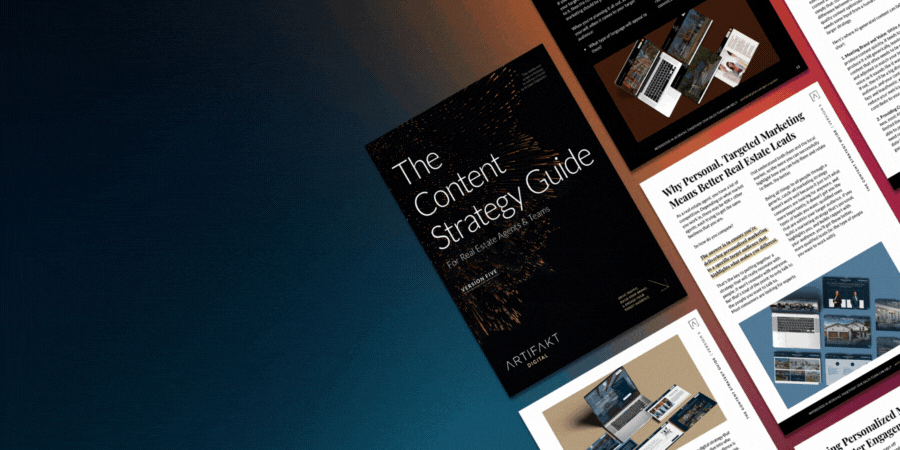One of the most important parts of a strong digital marketing strategy is a strong content strategy. The two go hand-in-hand if you want to see success in your marketing. That’s because your content strategy is a critical part of how you build opportunities to attract, connect, and engage with your target audience.
Content can take many forms, whether that’s creating a podcast, posting on social media, or writing value-based blog content that answers questions for the people searching it. Without a content strategy in place, people won’t be able to initially discover you, they won’t know what you’re an expert in, and they won’t know why they should hire you for their next real estate transaction.
However, with AI being pretty much everywhere, and automating things all around us, it’s easy to forget one of the other most important parts of your content strategy: people.
To see the most success in your content strategy, you have to put people first. That means content created by people, for people.
★ Want to learn more about building a quality content strategy? Have a look at these posts:
- Writing Successful Real Estate Content that Converts
- Optimizing Your Content for Humans (And Not Just for Search Engines)
- How to Plan Content that Attracts and Engages
Right now, AI makes it easy to generate a lot of content quickly and easily without much thought around what’s being created and who it’s being created for, let alone whether it’s part of a larger strategy or not. Most agents just focus on getting the task of creating and posting content over with, and figure that, as long as they’re posting something, that’s better than nothing.
But in most cases, that’s not true or effective. To see success in your content strategy, above all else: quality counts.
Before you’re planning your content, you have to keep a few things in mind::
- Who am I producing this for?
- Why am I producing it?
- Does this solve a problem for someone?
When you’re producing content, if you can’t clearly answer the above, there probably isn’t much value in what you’re doing.
At the end of the day, if you’re using AI to create content, quickly and lazily, your strategy is set up for failure (and in most cases, you’re better off producing nothing at all). Taking this approach, you likely won’t be able to answer any of the above points: you’ll simply be creating content for the sake of creating content.
What’s worse, is using AI to create content, and thinking that it’s also been “optimized for SEO”. SEO is a complex topic, and having AI produce 1 blog post, with the intention of ranking it in search, without a large search strategy in place, is effectively useless; even Google says so.
Google knows what’s spam and what isn’t, and quickly generated content, not produced for people or by people, is most likely going to be flagged as spam.
★ You can learn more about Google’s position on spam, low-quality content right here.
What matters most is that you put people first, by continually producing high-quality well-written content, that helps your audience and provides value around answering a question they have.
Another thing you need to consider is the reading level and behavior of your audience. The majority of people are looking for simple answers conveyed with clarity. When your content gets overly complicated, the message gets muddled, and the person reading the post or listening to the podcast can get frustrated and drop off.
If you’re using AI and this happens, your content will have failed from both a technical perspective and a personal perspective. Google will penalize you for having poorly written content, and your readers will get annoyed and not engage with content they can’t relate to.
When people are reading content online, they tend to skim things. This is why short, simple sentences, plenty of headers, and visual blocks to break up the content are so essential for online readers. It needs to be easy to get people to the end.
For how far AI-generated content has come over the past year, it still usually produces overly complicated, generic, and often awkward-to-read content. However ‘good’ you think AI-written content is, it’s never going to be as precise or engaging as content written for a person, by a person with a real passion and opinion about a specific topic.
★ Want to learn more about using AI in your real estate marketing strategy? Have a look at these posts:
- Building an Answers Engine Optimization (AEO) Strategy for AI
- Does Using AI-Generated Content Negatively Affect Your SEO Strategy?
- Leveraging AI Marketing Automation as Part of Your Inbound Marketing Strategy
Nowadays, it’s easy to think that AI can do everything for you, and while it can certainly be helpful, it isn’t able to truly create quality, helpful, well-written content that truly helps your audience. For that, you still need to remember that a people-powered, people-first strategy is the best approach to take.
Want to improve your content strategy? Download our Content Strategy Guide for Real Estate Agents. It has practical methods on how to plan, implement, market, and audit a successful real estate content strategy that will deliver results as part of your overall inbound marketing strategy.




